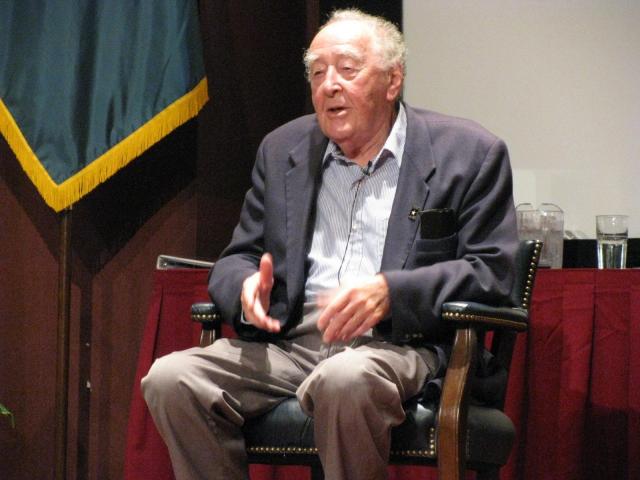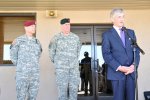Story Highlights
- "In 1937, I entered medical school and was ready to become the greatest healer in the world," he recalled of his young ambition.
- His (Hitler's) troops were cheered by everybody. There was no resistance ...
- They sent me away with my violin and a bag of clothes," he said.
- I heard my mother say 'We will never see our son again.' Those words are with me every day of my life, including today."

Even at 89 years old, Charles Stein has not forgotten how it feels to
have the door of opportunity and future possibilities shut slowly
before his own eyes.
He will never forget how he narrowly escaped death at the hands of the
Nazis while waiting for immigration papers. He will never forget that
his parents' denial of danger - the shutting of their eyes toward the
hatred and injustice around them -- led to their own death. He will
never forget the price the world paid when the evil Hitler regime ran
rampant in Europe.
And Charles Stein wants to make sure the rest of the world remembers along with him.
Sharing his memories of a stateless passport, the haunting words "Kill
that Jew!", society's apathetic response to Hitler's policies and his
desperation to escape, Stein recounted his experience as a survivor of
the days leading up to the Holocaust during Team Redstone's Days of
Remembrance Commemoration Program on May 8 in Bob Jones Auditorium.
Stein, who eventually escaped to the U.S. and served as both a World War
II and Korean War Soldier and a civilian intelligence expert with the
Department of Defense and the State Foreign Service, had his first
experience with anti-Semitism in 1938 as a medical student at the
University of Vienna, Austria.
"In 1937, I entered medical school and was ready to become the greatest
healer in the world," he recalled of his young ambition. "On March 11,
1938, I went to school that morning and in the top row (of the
classroom) I saw storm troopers in Nazi uniforms. Some had guns in their
belts. My mind went 'What is going on''
"At 4 p.m., I was walking home and I heard a lot of noise behind me. I
saw guys in Nazi uniforms chasing one student and yelling terrible
things like "Kill that Jew!" and other things so horrible. I found an
open door and went in a basement and hid there until I thought it was
safe. I went home and told my parents."
The next morning, Stein and his parents learned that Hitler had marched into Austria.
"His troops were cheered by everybody. There was no resistance and he
was going to march on Vienna ... We had no idea what was happening. We
had heard things about Germany. But this is before the particularly bad
stuff," Stein said.
Curious, Stein attended a parade welcoming Hitler and his Nazi army.
"All of Vienna and half of Austria were there. Everybody was there with
their hands up and cheering," he said. "At that moment, I knew it was
the end. We had to leave. I went back to our apartment and walked in and
told my parents 'It's time to pack.' A few days later it began."
Stein recalled a neighborhood shoe store owned by a Jewish couple where
Nazis confiscated all the shoes under the pretense that they were needed
by the government.
"The family was devastated. They'd lost everything they'd worked for,"
he said. "A few days later, the store owner was arrested. He was
probably taken to Dachau. The clean out of Vienna had started. Employees
took businesses from Jewish owners."
Stein had a stateless passport, meaning he could not claim any European
country as his home state, and he and his friends started visiting
embassies.
"We'd say 'We'd like to come to your country.' They laughed at us and sent us on our way," he recalled.
When the Germans came to Austria, Jewish people were no longer permitted
to study at the university, dashing Stein's dreams to be a doctor. Nazi
soldiers harassed, threatened and arrested Jewish people. One popular
practice in Vienna was to force Jewish people to clean sidewalks with a
toothbrush. While they cleaned, they were kicked and screamed at. Stein
relied on his student identification book to help him escape much of the
abuse.
But it wasn't long before anti-Semitism caught up with him.
"Two former classmates of mine who I had gone to school with in the same
classroom every day for eight years were in Nazi uniforms looking for
me. They were members of the Hitler youth," Stein said. "They went to my
house looking for me. I wasn't there. Later, when I was told about it, I
made a decision right then. I'm not going to come home anymore.
"I had quite a few Christian friends who were not Nazis at the time and
their parents would allow me to stay at their homes at night."
In August 1938, just a few months after Hitler's occupation of Austria, Stein got the chance to escape to Luxembourg.
"I went to tell my parents. My parents didn't have a passport. They
decided it wasn't going to be that bad. They sent me away with my violin
and a bag of clothes," he said.
"It was a tearful goodbye. Just as I stepped on the train, I heard my
mother say 'We will never see our son again.' Those words are with me
every day of my life, including today."
While in Luxembourg, Stein was assisted by ESRA, a Jewish organization.
He eventually made contact with a distant cousin in the U.S., and
received an affidavit of support that he took to the U.S. embassy in
Belgium. After several delays and a month after the war in Europe had
started, Stein was invited to get his U.S. visa. He arrived in New York
on Dec. 18, 1939.
"I was the only one of my whole family that had gotten out," he said.
With no money or influence, Stein could not pursue his dream to be a
doctor. Instead, he worked odd jobs until he was drafted into the Army
in 1941.
"I declared my intention to become a U.S. citizen - my 'first papers' -
and I had to sign up for the draft," he said. "On Sept. 15th, I received
two letters. The first one was from the Society of Friends - Quakers -
that said they had a scholarship for me at the University of South
Carolina. The second letter was from the draft board."
In June 1943, he was commissioned a second lieutenant in field
artillery, and soon was transferred to military intelligence, where his
fluent English and German made him an asset on the European front. He
served from Normandy to the Czech border, interpreting for and
interrogating prisoners on the front line.
After the war, Stein decided to search for his parents.
"I discovered they had been deported to the Lodz ghetto in 1941. They
did not appear on any survivor's lists ... It wasn't until 1995 when I
found out what happened to them. My parents were one of the first ones.
The Germans found the solution for their problem in January 1942.
Killings started in February," he said.
"My parents were taken out of the Lodz ghetto and gassed at Chelmno
along with several hundred others. Thousands were buried in a mass
grave. My parents and some of our family are there. In 1945, at the end
of the way, I was alone. My whole family was gone."
Eventually, Stein married.
"I now have three sons and seven grandchildren, and they all live around me," he said.
Quoting the poem "First they came ..." by Pastor Martin Niemoller, Stein
urged his audience to speak up for injustice so that the rights of all
people are protected.
"I want to tell you how amazing your story was and how much you touched
us today," Col. Jeffrey Young, AMCOM chief of staff, said after
listening to Stein's story.
"It really was a testament to your spirit. It's good to know your
children and grandchildren will continue your sprit - the indomitable
human spirit."
Stories like Stein's recollections and ceremonies such as the Days of
Remembrance Commemoration Program help all Americans to remember to "not
have an apathetic attitude about what is happening around them," Young
said.
During the program, candles of remembrance were lighted and an
invocation was given by Rabbi Bernard Honan of Temple B'Nai Sholom.
Also, winners of Team Redstone's essay and display contests were
recognized. Essay winners were: first place, Kim Torres of the Program
Executive Office for Missiles and Space; second, K.C. Bertling of Space
and Missile Defense Command; and third, Martin J. Roggio of Test
Measurement and Diagnostic Equipment. Display winners were: first place,
2nd Recruiting Brigade; second, PEO for Missiles and Space; and third,
Missile and Space Intelligence Center.
